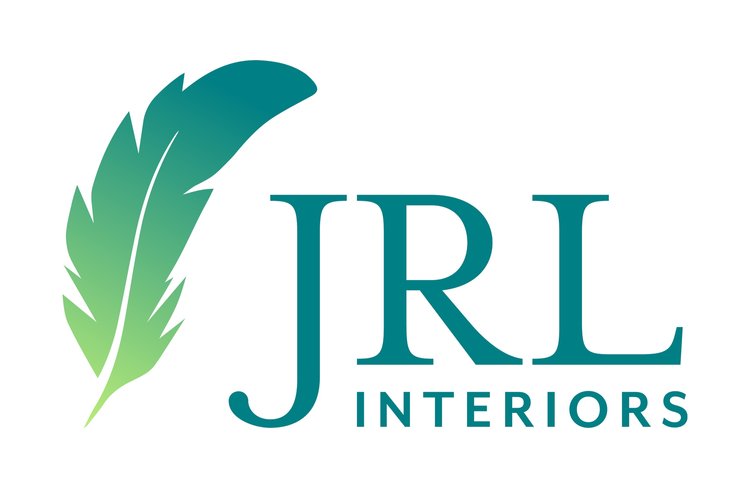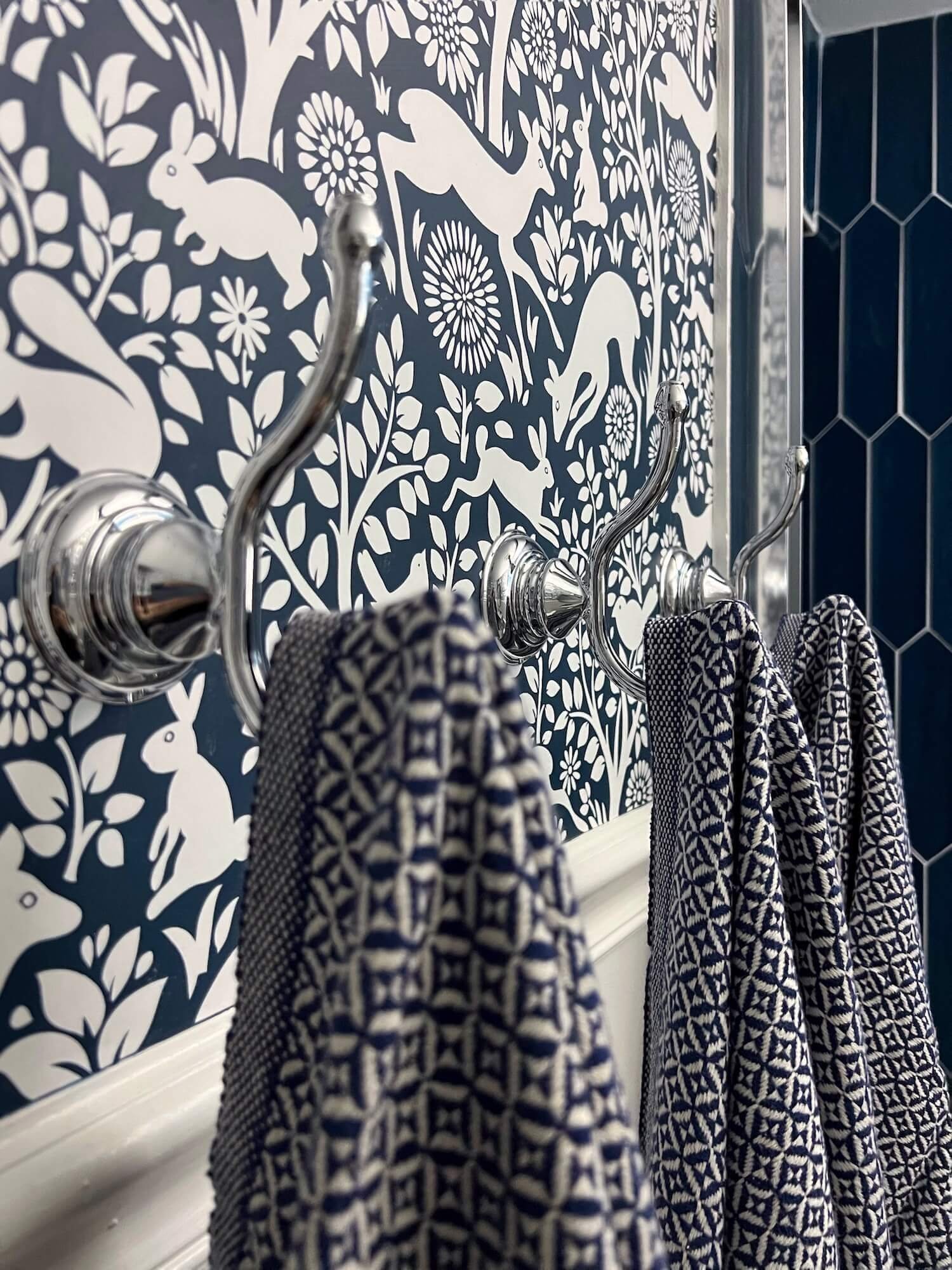Is wallpaper making a comeback? I would argue a resounding yes, it has ALREADY made a comeback.
I know, I know, I can HEAR you rolling your eyes … I too have spent agonizing days with a steamer and a scraper removing old ‘cute’ floral stripes from endless bedroom walls with no wish to repeat this torturous exercise. Ever.
But the new generation of wallpapers is much different and with proper wall preparation, removal of them won’t be the same torturous exercise described above.
I’ve even seen videos from the ultra luxury brand Gracie showing them removing their handpainted wallpapers in full sheets and rolling them up to be reinstalled for a new life elsewhere.
While there are certainly some exquisite classic painted finishes, like a beautiful lacquer, or a Venetian plaster, there are some that did not age well … we’re looking at you, sponge painting … which the do-it-yourself crowd embraced, often with the enthusiasm and skill of a 4 year old.
Now after the decades of white and gray and “modern farmhouse everything”, we long for ways to inject a little more PERSONALity into our spaces.
New technology, and a new era have arrived on our doorstep and with it – new wallpaper options. Re-invented archived historic patterns, faux finishes, murals, textures, metallic accents, trompe l’oeil and more.
Even if you think you hate wallpaper, the new choices may just surprise you. They offer pattern, elegance, warmth, and a variety of textures.
There is absolutely no faster way to add instant impact to a space than with a wallpaper.
Wallpaper Types
Peel and Stick
Invented primarily for the DIYer, there is peel and stick wallpaper. Just like the name implies, peel off the waxed paper backing and stick directly to the wall smoothing it into place.
Pros:
It is available in an enormous variety of patterns, is relatively inexpensive, and is easy to install.
This is a great solution for spaces where temporary is important, like dorm rooms or rental apartments. Peel and stick can be unpeeled and unstuck quite easily to return the walls to their original state.
Cons:
The downside is it does unstick occasionally. I used this type of paper for the interior of my closets for the One Room Challenge Dressing Room Do Over. And I confess it is starting to come loose at the top in a couple of places.
Many professional wallpaper installers refuse to install it. It tends to be thinner than most traditional pasted wallpapers
Patterned Wallpapers
From overscaled dramatic florals, to geometric trellis prints and stripes or all kinds, to pastoral, botanical, and chinoiserie there are thousands of options for wallpaper from understated to bold.
Quiet, monochromatic polite patterns offer a more layered background than a plain wall.
Bold patterns and scenic murals offer the show-stopping element to bring drama to a space.
Pros:
These can add so much sophistication and impact to a room.
Cons:
The larger the pattern scale, the more waste there is when matching seams. Paper are printed with a pattern repeat and a straight or drop match. These factors will be important in determining the amount needed to match the pattern from strip to strip.
Textured Wallpapers
There are wallpapers that mimic beadboard and embossed patterned anaglypta and lincrusta wallpapers. These mostly come in white and are intended to be painted.
Flocked wallpapers have returned. Often in Art Deco-inspired patterns, these embossed velvet papers are a dramatic option for the adventurous.
The most classic textured papers are grasscloths. These elegant papers are woven of natural grasses and come in natural and a variety of colors, as well as options topped with painted designs.
Pros:
Grasscloths add beautiful texture and undeniable elegance to any space.
Cons:
The nature of the grasscloth (woven grass) means the cut edges at the seams are visible as there is no way to match the weave across the seams. This is considered part of the beauty and is expected, but if seeing seams will drive you batty, this is not the option for you.
Metallic Wallpapers
Wallpapers that mimic antique mirror, metal, or gold or silver leaf are available.
Pros:
These offer an easy way to get the look of a wall or ceiling of one of those finishes without the challenge and expense of the actual material.
Reflective surfaces bounce light around a space creating a warm glow.
Cons:
While smooth prepped walls are essential for all wallpaper installations, any bumps or anomalies are much more obvious under papers that have a reflective surface.
Vinyl Wallpaper
Originally meant to be a more commercial option, vinyl wallpaper is more durable. Many, many prints and textures are available in vinyl paper and it is equally at home in residential settings.
Pros:
Vinyl wallpaper is generally more scrubbable making it the natural choice for playrooms, kitchens and mudrooms where it is likely to need frequent cleaning.
Cons:
Depending on the particular paper, inexpensive vinyl options can sometimes look less refined and plasticky.
Where to use wallpaper
If you are on the fence about using wallpaper, consider trying it in a place where it can have a big impact but that you won’t spend enough time in to worry of tiring of it….Powder Rooms are PERFECT starter spots to dip your toe in the wallpaper pool!
Consider using it above wainscoting in a mudroom, dining room, or bathroom to add pattern and interest. Bonus tip: paint the millwork in one of the colors from the paper.
Use it in a foyer to set the tone for the home.
Use it on an accent wall - like the main wall in a bedroom or office.
Use wallpaper framed with molding to create panels for a spectacular wall treatment (an excellent way to use less wallpaper and avoid seams!)
Despite the name, wallpaper is not just for walls!
Use it in closets, or to define alcoves or niches.
Try it to add fun a pattern to stair risers
Use it on a ceiling to add pattern or texture overhead.
Line the back of bookshelves or open or glass cabinets with wallpaper to contrast with the frame and set off the elements on the shelves
Wallpaper Ordering Tips
Ordering wallpaper is confusing at best! Wallpaper from different manufacturers is sold and priced differently and comes in different sizes and even different widths.
Wallpaper from most US manufacturers is typically priced by the single roll, but is actually sold in double rolls (also called bolts). So if a single roll is priced at $56, the cost of the bolt would be $112. On rare occasions, it may even be sold in triple rolls.
US wallpaper bolts (2 double rolls) are often, but not always, 27” wide and 11yds long - this size covers approximately 74 sq ft. For reference, a 5’ x 5’ powder room with 8’ ceilings is roughly 160 square feet of wall.
Designer wallpaper brands are more often sold by the yard with minimum yardage increments of 5 or 8 yds.
Some wallpapers are “wide width” and can be 36” wide rolls or more.
Mural papers are typically sold in panel sets. Some companies will size the mural to your wall size for a perfect image fit.
Wallpaper will have a run number that indicates the batch of printing and means that run will all be the same dye lot. Because dye lots can vary batch to batch, it is REALLY important to get enough wallpaper to complete the job all at the same time so it will all by the same dye lot.
Different wallpapers have different installation requirements.
Some are prepasted, some are peel and stick as discussed earlier. Most professional installers prefer unpasted papers.
Some papers are pre trimmed, some require trimming on the seams for a perfect match. Some require the paste applied to the wall rather than the paper.
For dark ground papers, it is advisable to paint the wall the background color at the seams so any shrinkage or separation at the seams is not obvious. I have even once seen an installers color the ends of the rolls of a dark paper so the seams would have dark edges.
I highly recommend having your installer specify the amount of paper needed to avoid over or under buying!
Other posts you might enjoy:








